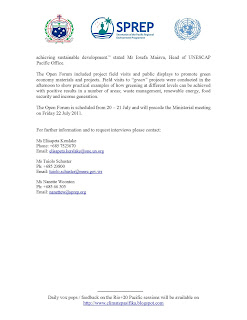By Clive Hawigen cliveh@sprep.org
20 July 2011, Apia Samoa
"Sustainable development is a much overused word and it’s been so overused, I think it’s lost any meaning it might once have had. What is clear for the Pacific Islanders is that they depend totally on the resources of the ocean and in order to have sustainable livelihoods they need an ocean that is healthy, which means that it needs free of any climate change impacts. This means fish stocks need to be sustainably managed and not overfished and it also means that local communities can have access to the resources in which they depend and have a proper say in their management." - Michael Donoghue, Executive Director Pacific Islands Program for the Conservation International
"It’s important because we here in the Pacific, we really dependent on the ocean and thus far many of the proposals made at the global level only pay rhetorical tributes to the contributions that the oceans bring to the environment and to our economies so blue economy, for us is an important approach and I think that’s why Pacific Island countries should be more attuned to the details of it and to be promoting it wherever it can especially in the lead up towards Rio+20 next year." - Fei Tevi, Pacific Council of Churches
"The way I look at it, a green economy is basically the blue economy, but for the Pacific Island Countries there is really on what we have, which is the blue economy. A lot of our focus at least on the Rio +20 process should be on what we have, the ocean, the fisheries so as I mentioned this morning we need to get more benefits from what is taken out of our waters. That’s one way of benefiting from the green or blue economy whatever way you want to say it." - Jeem Lippuwe, Federated States of Micronesia’s Ambassador to the UN
"I think the Pacific Island has the biggest ocean on earth therefore it has most of the ocean or marine resources available. With that in mind it is very important for small Pacific Island countries to think of ways that can help them sustainably manage these resources because they have been depending on this for years and years to support their livelihood. I think it’s very important for Pacific Islanders today – this concept of green economy and for them to try and also think about sustainable practices or ways that can be used to manage their oceans and most importantly the resources that are available in the Pacific Ocean. However, having saying that I must say that there are challenges as well for Pacific Islands to achieve this goal. We know we are very limited with a lot of things like funding, limited with human resources or expertise especially in helping to manage the resources that are available in the Pacific Ocean. We are also limited with capacity building and these are real challenges. It’s easy to say it but when you try to put it in real practical terms it’s going to be very difficult for the Pacific Islands so I think it’s a new concept but I think Pacific Island should all work together to come up with clear strategies or methodologies and with technologies that can be used in the region to apply the green economic concept, in this case managing the Pacific Ocean and its resources." - Trinison Tarivonda, Department of Environment, Vanuatu






